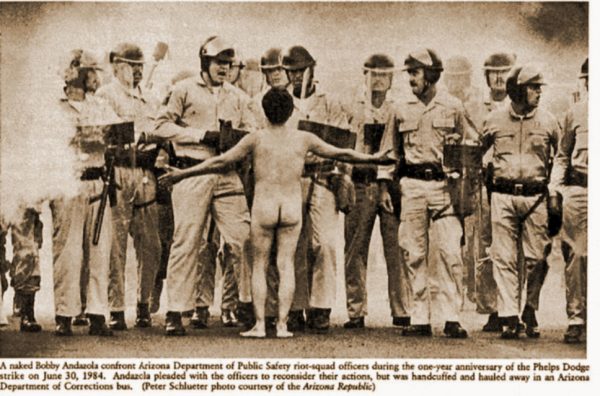In 2016 I went to the combined Clifton Morenci High School Reunion for the classes of 1966. Since 1966 the High Schools have consolidated. The high point for me was when Joe Sorrelman made a point of coming over to me and saying hello. He showed a recent picture on his phone of his uncle who had been a Code Talker in uniform being supported on both sides by soldiers in dress uniforms at some ceremony.
Joe is the last of the Morenci 9 Marines. Nine guys who went down on July 4th 1966 after graduation to enlist in the Marines. Of the three survivors Leroy Cisneros and Mike Cranford have passed leaving Joe. The story of their enlistment and high casualty rate made local and national news for a while. The West Point class of 1966 was noted for a losing five percent of their class. Ten percent of the Morenci 1966 class died in Vietnam.
Professor Kyle Longley spoke. He wrote an excellent book “The Morenci Marines – A Tale of Small Town America and the Vietnam War.” The book focuses on the men and family more than tactics and strategy.
“I never really go back to Morenci,” Sorrelman said. “It’s not the same no more.”
The reason the reunion was held over 200 miles away from Clifton/Morenci was because almost none of the alumni live anywhere near the area, and do not feel comfortable in the area. As Joe was quoted in the Arizona Republic “I never really go back to Morenci,” Sorrelman said. “It’s not the same no more.”
In 1983 Phelps Dodge Corporation maneuvered to break the Unions in Morenci and the worst floods in history hit Clifton. For Central Pennsylvania it would be as if the Middletown and Steelton Olmstead Air Force Base, and Bethlehem Steel had closed and Hurricane Agnes had hit all at the same time.
Nuclear engineer Dave Webster an old friend from Clifton shared his story at the reunion. After the 1983 floods he came back to help his parents. They were in the house looking at the damage, three feet of silt in the house with bathroom fixtures hanging from pipes forced up from air in the lines. Governor Bruce Babbitt’s limousine and state police escorts stopped by to survey the damage and make empty promises. As the Governor spoke, the younger brother of Dave’s neighbor stood high up on the canyon wall and started throwing rocks down at the group. The Governor’s party jumped into their cars and sped off. The old Anglos spent a moment savoring the thought of the “pinche cabron” fleeing.
A month earlier the Governor had ordered masses of state police and National Guard into town. As Anna O’Leary described the invasion: “On the morning of August 19, 1983, sleepy residents of the sister cities of Clifton and Morenci awoke to a strange pulsation. At first it appeared as a muffled and distant heartbeat. It was, perhaps, for some initially confused with the steady murmur of the locomotives that routinely moved masses of ore and copper through the communities and to their destinations, until recalling that those engines had been still for weeks, since the beginning of the strike. Vietnam vets heard the low rumble, and perhaps experienced tortured flashbacks, and uneasy feelings.”
And there it was: a miles-long convoy of armored tanks, vehicles and Huey helicopters—over 100, fully equipped with armed soldiers, swat teams, undercover agents, making its way up the mountain road, steadily, steadily, making its way to its new-front line, at the gates of the company facilities.
The strike was crushed, the unions decertified and an estimated third of the town’s people left never to return.
“In the name of Lord God, Lord Jehovah, would you do this to your own brothers and sisters?”
Trying to stop the Highway Patrol from clearing the picket lines, Bobby Andazola striped down to approach the officers and begged them to consider what they were doing to the towns. He yelled furiously at the troopers, wishing the whole world to hear, “In the name of Lord God, Lord Jehovah, would you do this to your own brothers and sisters?”
The trooper replied, “You have the right to remain silent. Anything you say can and will be used against you in a court of law. You have the right to an attorney. If you cannot afford an attorney, one will be provided for you. Do you understand the rights I have just read to you?”
Left unsaid was: we have the firepower to destroy you and everyone you know, survivors will spend the remainder of their lives in prison and your children will wander the earth homeless. There was no need to state the obvious to people that had generously supplied soldiers for every war for the past century.
The company, contrary to agreements, cut off access to health care for striker’s families. Dr. Jorge O’Leary vocally defended the strikers. He was fired from his job at the hospital, and set up a clinic to provide low cost medical care. Truly the sainted doctor deserves to have a song.
To the veterans, thank you for your service, indeed.


